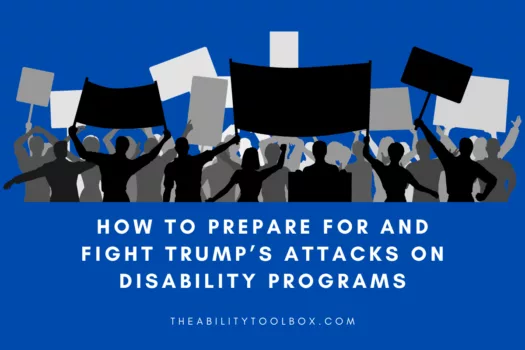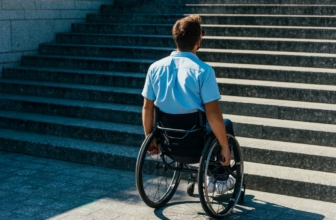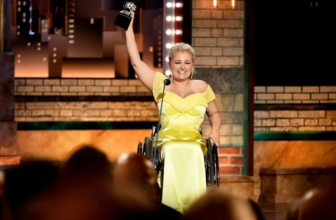If you're worried about the Trump administration and Republicans cutting Medicaid and other disability services, here's how you can prepare — and fight back.
Since January 2025, the disability community has been under a constant onslaught of attacks from the Trump administration. From cutting DEI initiatives that include people with disabilities to falsely blaming disabled people for a plane crash, it’s become clear that we are among MAGA’s many targets.
Many people with disabilities are afraid that our services are on the chopping block, especially Section 504, the ADA, affordable housing vouchers such as Section 8, and Medicaid, which pays for in-home care and other critical services.
As a lifelong disabled person who uses a wheelchair and relies extensively on Medicaid to pay for my personal care assistants, I am certainly worried. However, I’m not going to be helpless in the face of fear. Instead, I’m making plans, and you can too.
I’m starting this guide by using my knowledge gained from being forced to move after surviving a home invasion robbery 10 years ago. But I also want to hear from you, and I'll update this article with more suggestions. Let’s crowdsource solutions as an antidote to the poisonous fear.
Don't panic.
Everyone’s afraid right now, and it’s understandable. I’m not going to try to tell you that nothing bad will happen, but living in a state of fear won’t help. Take a breath. Go outside and touch grass, as Gen Z likes to say.
Stop doomscrolling. It’s important to follow the news, but you can check it for 10 minutes once a day instead of spending hours obsessing over every possible thing that might happen and what every absurd proclamation from the White House could mean. If you become mired in the what if, you can’t take meaningful steps to protect yourself and others.
Try to get some perspective on what’s actually happening. As of this writing, Trump is primarily using shock and awe tactics to instill fear. Many of his executive orders have already been shut down by the courts as blatantly unconstitutional. He’s trying to appear strong because in reality, he is a weak president who doesn’t understand the law and just wants to abuse his power as much as possible. This video explains it better than I can. (Video is captioned.)

Every hour you spend worrying about what might happen is an hour that you could spend either engaging in healthy self-care practices or making a difference in your community. Both are equally important.
Understand the real risks and what you can do about them.
The Trump administration’s actions are already hurting people, and I don’t want to downplay that. But Trump and Musk cannot wipe out our disability benefits or Medicaid in one fell swoop. They would need Congress to do that. Many people from both parties rely on SSDI, SSI, and Medicaid, so cutting them would be incredibly unpopular.
Out of all our programs, Medicaid is most at risk under the Trump administration, but there will be a lot of outrage and many opportunities for you to get involved and fight back. Be ready, but don’t spend precious time worrying when you could be preparing.
Organize your paperwork and store it in a secure, easy-to-access place.
Make sure you have your birth certificate, Social Security card, SSI/SSDI letter, and any other important papers such as your car’s title and registration, the deed to your home, a copy of your mortgage, lease, etc. If anything is missing, order a replacement right away. If you have to move to a different state, you will need an original/certified birth certificate and Social Security card to apply for services.
Store your documents in a secure location, preferably a fireproof safe or lockbox. Save photos of everything on your phone or a USB drive as a backup.
Document everything related to your disability services.
Organize all the documentation you have submitted or received regarding your disability and the services you utilize, and store it with your other essential papers. This should include medical records related to your diagnosis, a list of your prescriptions, past out-of-pocket medical expense records used for tax or countable income deductions, etc.
If you have in-home care, keep a copy of the Notice of Action showing how many hours you receive. Make sure you have written documentation of how you use your hours, such as an example daily schedule. Ask your primary care provider and/or another health professional such as your physical therapist for a letter affirming your need for services at the current number of hours. Make sure the letter explains why you need those hours and the life-threatening health consequences that would ensue if your hours were reduced or eliminated.
Sign up for every program you can, now.
Have you been hesitant or unsure about whether to use a disability program or social service for which you are eligible? Now is the time to sign up. Some programs may continue but close to new applicants — you don't want to lose an opportunity. The more services and supports you can obtain, the easier it will be to survive cuts, and/or demonstrate your need if they try to make cuts.
Appeal any service cuts or denials.
Every state has a process to appeal service cuts or denials. If you’re not facing cuts right now, it’s a good time to familiarize yourself with the process so you’re less overwhelmed if it happens. If it’s already happening, take a moment to breathe and then file that appeal. Note that there’s often a fairly small window to file an appeal, so it needs to be on the top of your list, but you can take 24 hours to pull yourself together so you're not acting out of emotion.
Put yourself first.
I’ve noticed that some service providers try to pit people in the disability community against each other by suggesting that if you don’t accept either cuts to your services or lesser services, others will suffer. They’ll use an excuse like, “If we give this to you, somebody else won’t be able to get services at all.” They’re trying to make you compete in an oppression Olympics you never asked to join based on a false pretense of artificial scarcity. There is or should be enough funding to help everyone, and If there isn’t, that’s not your fault, and it’s not your responsibility to accept less because of some theoretical person who might not get what they need. Don’t allow them to put their own guilt on you.
You’ve probably heard that saying taken from airport safety guidelines that you need to put on your oxygen mask before assisting the person next to you. That person will still survive if it takes you a couple of seconds to put on their mask, but if you don’t put yours on first, you could both pass out. Putting your needs first doesn’t take anything away from others. In fact, it empowers you and strengthens you so you are in a position to give back and lift others up.
Help others.
One of the best antidotes to the poison of the Internet and doomscrolling is connecting with others. We all have needs, and we all have something to give.
I highly recommend getting involved with a mutual aid group in your community. Most cities and even small towns have mutual aid groups where people can offer and request items and support. Most of these groups are on Facebook. Yes, Zuckerberg is an a-hole, but until there's a better alternative, connections to your community are more important. (You can get rid of your X account though, nothing positive happens there.)
When you join the group, start out by helping others. Look through existing posts to see what you could offer. Maybe somebody needs food and you have a few cans in the back of your cabinet that are still good. Perhaps a local nonprofit needs volunteers.
Of course, you can request help in mutual aid groups. If things get worse, they can be potentially life-saving for disabled people. But their most important function is to build interdependence and foster a community of people helping each other. It’s the perfect antidote for loneliness.
Do some light prepping.
Hopefully, you’ve already thought about what you would do in an emergency such as a tornado, hurricane, or earthquake. If you haven’t already, now is the time. Most of that advice also holds for situations where we might lose access to disability services and/or healthcare. Here are a few things to consider and have on hand, depending on your budget and circumstances.
Extra prescription and OTC medication.
Ask your doctor about samples or whether they could call in an extra prescription for you. This can be tricky for controlled substances, but it's often possible for others.
A spare mobility aid.
Always keep your previous, older wheelchair, walker, etc. in case your main one breaks or sustains damage. If you currently only have one mobility device, research local organizations that have free mobility and medical equipment. I help run such an organization in the state of Indiana, and have found that there are many across the country.
Extra food and pet food.
Only buy things you would normally use, and then rotate them out quickly. While food banks are a great resource for people with disabilities, they may face increasing demand, so it’s good to have a couple of weeks of supplies available at home just in case.
Please don’t build a bunker and stock up on astronaut food for when SHTF. Don’t get me wrong, I enjoy a good prepper YouTube channel, but it’s not a likely scenario. You’ll just waste a lot of money.
Learn to cook healthy on a budget.
Most farmer's markets now take food stamps and you can often get double their value in fresh produce. This is an incredible resource – use it!
Cooking at home gives you more control over what you’re eating. You will save a lot of money by not buying prepared and processed food. The Internet is full of free recipes and cooking videos to get you started.
If using a stove or oven is difficult because of your disability, an instant pot, air fryer, crock pot, or even a microwave can enable you to cook healthy food. These appliances are readily available at thrift stores and on Facebook Marketplace, too.
Learn a new skill.
If you're reading this, you can learn something new today, for free, that can be useful to you or someone else.
I taught myself HTML in the 1990s and I'm still building websites today. You can learn web design, 3D design, graphic design, coding, and other computer-based skills using YouTube and online tutorials, then start a small business. If computers aren't your thing, you might enjoy sewing, knitting, crocheting, or painting. Think about your interests and hobbies and how you could turn them into a marketable skill.
Look for cash jobs and/or part-time jobs.
From pet sitting to social media to selling on Facebook Marketplace, there are lots of ways to earn extra cash. But you don’t have to hide from the government to work as a person with a disability.
Did you know that if you have SSDI or SSI, you can work and still keep your Medicaid? Every state has a working disabled program to allow this, and I highly recommend utilizing it if you’re able to do so. Most disabled people I know who manage to achieve a middle-class lifestyle do so using one of these programs.
Aside from the overall threats to Medicaid, working disabled programs are unlikely to be at risk since they incentivize work and are therefore popular with Republicans.
With that said, if you can’t work at all, please don’t panic about proposed Medicaid work requirements. In the past, people with disabilities have always been exempted from proposed or implemented Medicaid work requirements. That’s highly unlikely to change. As long as you have SSI or SSDI, you should be safe from work requirements.
Start saving money.
Yes, this is very hard when you rely on disability income. I am fortunate to have more privilege in this regard. However, I know disabled people who have managed to build some savings despite the challenges, so it’s worth the effort.
If you don’t have one already, open an ABLE account. This will allow you to save more than the $2000 resource limit for Medicaid and SSI without facing any penalty. ABLE accounts are now open to people who became disabled before age 26 (increasing to 46 in 2026). That means when you developed a disability, not when you applied for or obtained SSI or SSDI.
ABLE accounts are unlikely to be at risk under the Trump administration — it's a little-known program that doesn't cost the government much and incentivizes work.
I don't recommend keeping large amounts of cash at home as it could make you a target for robbery, or someone might report you to the government for having too much money. Although it would be difficult to prove, you don’t want that hassle. Keep your financial business to yourself and be safe.
Some easy ways to save money:
- Cancel your streaming services. Install the ad blocker Ublock Origin on your computer or phone web browser and you can enjoy YouTube ad-free. You could also use pirate streaming — look up “fmovies.”
- If you live in an apartment, share WiFi with a neighbor.
- Switch to cheaper phone service such as Mint or Cricket.
- Join a Buy Nothing Facebook group. They're a free alternative to thrift stores if you need an item or have stuff to give away.
If SHTF, go to the ER.
I’ve spent this entire article outlining why the worst probably won’t happen and what you can do to keep yourself safe. But if it does happen, if you end up in a crisis situation such as becoming homeless or having to flee your state of residence, go to the emergency room. If you have a severe physical disability and can’t do ADLs like dressing, bathing, and going to the toilet, they have to help you. They must admit you until they can find another placement for you. It will be terrible, and you might experience a health decline, but you don’t have to end up on the street.
For most of us, living in a nursing home is our worst nightmare. If you’re facing this scenario, though, there is some good news. If there’s a Medicaid waiver in your state that covers home care, and you’re on the waiting list or applying for the waiver, being hospitalized or placed in a nursing home puts you at the top of the list. If you advocate strongly for yourself, there's a good chance you can get onto the waiver and back into the community. I truly hope this doesn’t happen to any of you, but if it does, all is not lost. No matter what, there is hope.
These are tough times for everyone. If you can help somebody who is being persecuted by the Trump administration, whether because of their disability, immigration status, or LGBTQ+ identity, please do so. We’re all in this together.
If you have suggestions to add to this guide, please send them my way. I will be updating it frequently.
Current Advocacy and Action Resources
Join an advocacy group, make a phone call, send a letter — fight for your rights!
Resources for Surviving With a Disability
- Tips for Moving to Another State with a Disability
- How to Get On — a self-advocacy guide for getting the disability services you need
- How to Find Accessible Housing
- How to Make Your Home Accessible on a Budget
- Medicaid Consumer-Directed Home Care Waivers State by State Guide
- Medicaid Waiver Waiting List State by State Chart
- Status of State Medicaid Expansion Decisions: Interactive Map
- How to Port Your Section 8 Voucher
- Partnership for Inclusive Disaster Strategies — organization advocating for better emergency services for people with disabilities
Founder and Editor-in-Chief of The Ability Toolbox. I received my BA in English from Stanford University and MA in Clinical Psychology from Antioch University Los Angeles, and have worked in entertainment and health media for over 20 years. I also blog about traveling with a disability. As a wheelchair user with cerebral palsy, I am deeply committed to amplifying the voices of the disability community through writing and advocacy.







